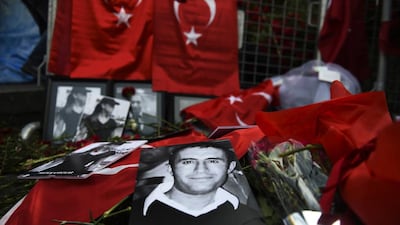Across Istanbul in the early hours of 2017, a freezing, sleety rain pummelled anyone brave enough to venture out into the streets. Inside and sheltered from the weather that has lashed the city for weeks, thousands of people packed into restaurants and clubs to welcome in the new year, a year they hoped would be better than the previous.
When my taxi driver, an elderly man in a ramshackle Fiat who struggled to see through the rain pouring down the windshield said there had been a shooting incident at a club 20 minutes north of the airport from where I got in, little did I imagine that within hours, 39 party-goers and nightclub staff – not soldiers or militants – would be dead.
The new year in Turkey had begun with a sadly familiar tone.
Ortakoy, to where the Reina nightclub has attracted revellers for more than a decade, is the kind of place where restaurant names such as “New York Fries” are deemed appropriate.
It’s an area where joggers and cyclists compete with buses along the narrow Bosphorus Strait shoreline. It is home to some of the millionaire footballers lured to the city by Turkey’s most famous nightclubs and a neighbourhood frequented by many Middle Eastern visitors.
Among the victims of the nightclub massacre were 20 Arab tourists – more than half the death toll – who had come to experience a New Year’s Eve party and a fireworks display by the Bosphorus waterway and suspension bridge; a scene, they had hoped, would be unlike any other. But only death greeted them.
“We searched for him for two days in the hospitals. Then we came to the forensic institute. Relatives who entered the morgue confirmed that one of the bodies was him,” an unnamed friend of 32-year-old Saudi national Abdullah Amed Abbolos told Turkish media. Others were from Tunisia, Syria, Iraq, Morocco, Kuwait, Jordan and Lebanon, all celebrating in a city they thought was safe.
There is another side to Istanbul, one that has served as a temporary shelter to foreign militants, who, for several years have moved with considerable ease between Syria and the rest of the world. It is a facade of the city that the nightclub assailant, who in video footage of the attack, appeared to be an experienced shooter, may know well.
In these areas, districts close to Ataturk Airport, dozens of people have been arrested for direct and indirect links to ISIL, the terrorist group that has claimed the attack. The Reina suspect set out on his journey from Zeytinburnu, seven miles from the airport.
Extremism is on the rise in Istanbul and questions must be asked, for example, why security seems so haphazard. Particularly perplexing is how an assailant could travel freely across the city, through areas housing a stadium, ferry and bus terminal and offices of the prime minister, just three weeks after a double-bombing that killed 44 people in the Besiktas municipality, just a few miles from the nightclub.
Authorities say a manhunt is closing in on the attacker but he was still unapprehended at the time of going to press. Security in the capital continues to be lax. Armed guards and metal detectors have lined entrances of shopping malls and the Metro since last July’s failed coup d’état. But they are often unmanned or simply wave commuters through. Just hours after the Reina massacre, municipality street sweepers were even seen walking into the club through a side entrance and mingling among investigators.
Ask the people who is responsible for Turkey’s deepening woes and fingers point to the PKK (Kurdistan Workers’ Party), CIA, ISIL or exiled cleric Fethullah Gulen. Some argue that the AKP (Justice and Development) Party government has deflected blame for its own security and policy failures, because three years ago, at the height of anti-government protests centred on Gezi Park, many saw president Recep Tayyip Erdogan as the biggest villain.
Conflict with Kurdish separatists and ISIL militants, at home and in Syria, and battles against political enemies of the government, have turned Turkey into a swamp of instability.
The statements that follow each attack in which the president vows to do everything to defeat terrorism have been heard so many times over the past 12 months that they now ring hollow among Istanbul’s residents.
For many of the urban elite, the Reina attack and the failure to catch the perpetrator in the days that followed, mark a new departure in their lives; it was one thing to hear of soldiers and Kurdish civilians killed in faraway clashes in the southeast but quite another to now see violence drawn squarely into their streets, homes and nightclubs.
Stephen Starr is a journalist who has lived in Syria and Turkey since 2007.

